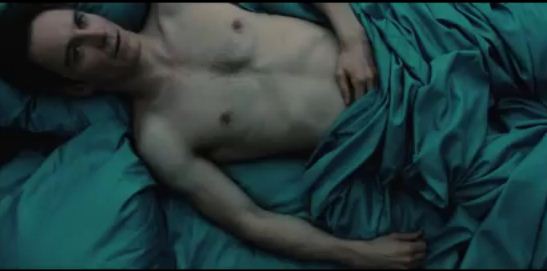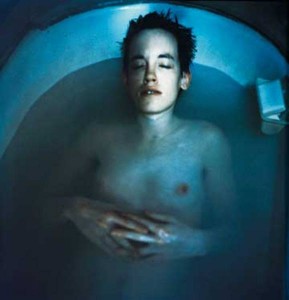The British artist and filmmaker Steve McQueen’s new film Shame explores the desires and mentalities of the Wall Street boys, who have so much of the world’s economies at their fingertips.Whether consciously or not, it shows how much their actions revolve around a homoerotics that in its closeted shame displaces desire across the cash nexus. These boys get off when someone gets paid.
Whether consciously or not, McQueen evokes Nan Goldin’s classic photographic project The Ballad of Sexual Dependency in his film. His visual technique centers on long still shot, like the opening frame of the movie, below:
This is Goldin’s aesthetic all over: the mix of found color and beauty in the midst of urban sexual counterculture. Look here for the color:
Or here from the Ballad, for the off-center framing, the stillness:
The difference, though, is that Goldin was a participant on the scene and, as such, welcome to photograph. Her subjects know she is there. McQueen uses his camera in classic directorial fashion, wowing us with long tracking shots and composition in order to ask us to forget why it’s there at all: classic cinematic realism.
If Goldin knows what sexual dependency is because she suffered from it, what is the “shame” in McQueen’s film? The overt narrative says that Brandon (Fassbender) is a sex addict who is shamed by his problems and increasingly comes to suffer for them. In order to accept this, we need to buy into–word choice deliberate–the idea that sex is an addiction. The film then proposes a solution: a committed monogamous relationship, somehow predicated as being beyond “sex.” And a punishment: the necessity for Brandon to seek out anonymous sex in a gay bar. While he is thus engaged, his sister Cissy (Casey Milligan) is attempting suicide, just in case the viewer wasn’t sure if it was a bad thing to do. This version is proposed by all the reviews I’ve seen and is supported by McQueen in interviews.
So the manifest content of the film argues that Wall Street is limitless, rampant greed, which is fine. And that same-sex desire epitomizes that relationship at its worst, which is not fine at all, although it certainly reinforces the interface of homophobia and neo-liberalism.
There’s another set of desires and drives at work here, though. In keeping with one set of psychoanalytic readings of the Don Juan complex, it could be said that Brandon’s gay encounter is the pinnacle of his desire, not the abyss of his degradation. In this view, the hyper-heterosexual is constantly acting out a repression of queer desire.
The “Wall Street” part of the film revolves around this displacement. We know it’s Wall Street because we frequently see the Fulton St-Broadway subway station, handy for both OWS and the Street. Brandon’s boss Dave, a rather gormless individual, clearly has what is euphemistically called a “man-crush” on him. He acts this out by sleeping with Cissy minutes after meeting her, much to Brandon’s displeasure. If the film lays on a clumsy aura of incest to this anger, it can’t entirely dispose of the sense that it was Brandon who really wanted to sleep with Dave and vice-versa. Dave is so enamored of Brandon that, even when the latter’s huge stash of porn is discovered on his work computer, the supposedly “high-tech” company is baffled as to who downloaded it.
You could also suggest that the later section of the film isn’t “real” at all. If we go through Brandon’s bad day, he supposedly tries and fails to have sex with the nice girl Marianne, uses the hotel room for commercial sex anyway, then goes out bar hopping, leading to dirty talk and intimate touching at the bar, a fight, the blow-job in the gay bar, culminating with a paid three-way with two women. At the end of all this he finds himself in his bathroom at home, where Cissy has cut her wrists. There’s masses of blood, although when we see the pair in hospital, the cut doesn’t seem that terrible. In The Interpretation of Dreams, Freud suggests that it’s possible to experience a long fantasy sequence in a brief space of real time if you’ve had the fantasy before. So one interpretation would be that when Brandon discovers Cissy in one of her self-cutting moments in the very bathroom where he so frequently masturbates, it releases the carefully constructed fantasy sequence by which Brandon is “forced” to have gay sex.
I want to be clear that I don’t think that this is the “right” interpretation of Wall Street and that if those bankers would only get in touch with their queer side, everything would be ok. The moments that resonated for me most in the film were the ways in which the cash nexus was so eroticised, such as when a sex worker counts her money early in the film, or when a woman working on a webcam sex-show knows Brandon by name and “what he wants.” It’s not for nothing that the porn industry calls male orgasm in straight porn the “money shot.” I’m not anti-sex or even sex industries but the shame here is the replacement of social life with the cash nexus–and to actually live as if “I’m loving it.”



